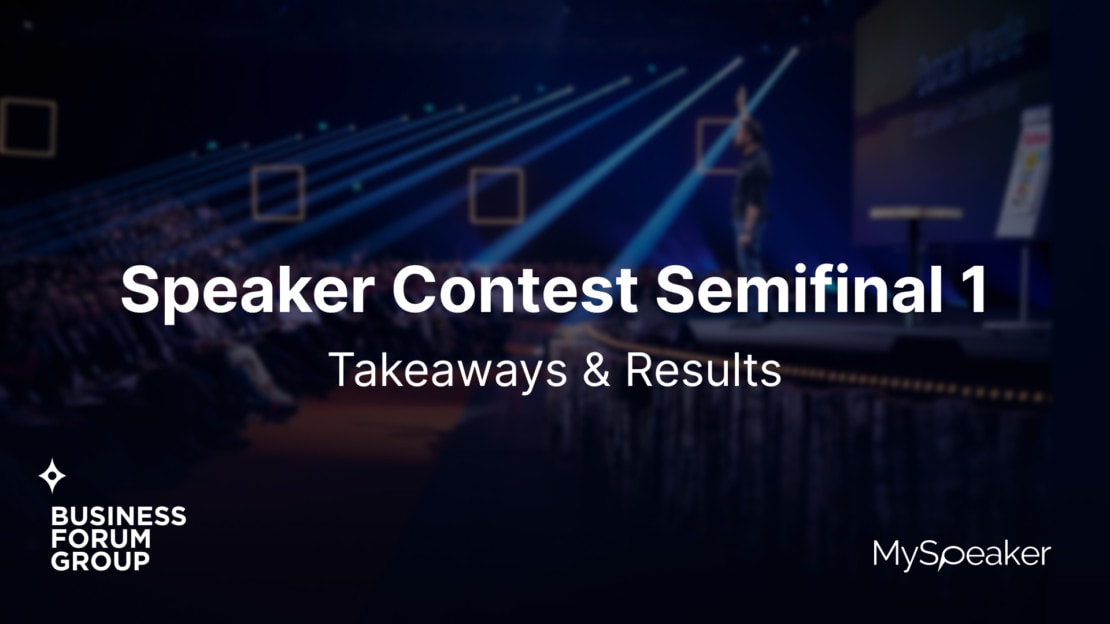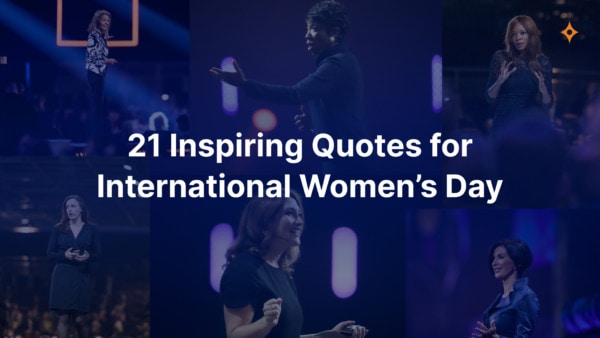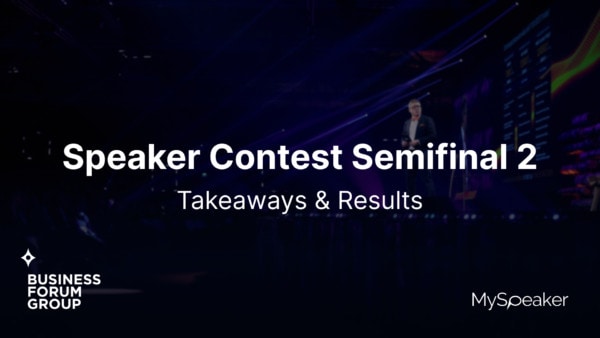8Mar2023
The 2023 Nordic Business Forum Speaker Contest opened in style today as the panel of judges cast their eyes over the first batch of inspiring keynote speakers. Centred on the themes of leadership, innovation, and sustainability, we’ve summarised the key takeaways from the presentations delivered by Edwin Spee, Cecilie Kjeldsberg, Ramesh Muthusamy, Uku Tomikas, Antoni Lacinai, and Maryna Saprykina below.
Edwin Spee – It’s All about Mentelity
“How can we stay happy and positive, no matter what happens in our lives?” In Edwin Spee’s deeply touching keynote, he recounted experiences from his life as both husband and coach to paralympic snowboarding champion, and personification of what it takes to meet adversity with a smile, Bibian Mentel.
Despite being told she would never snowboard again after cancer caused her leg to be amputated, she won a gold medal in the able bodied championships just 7 months later. This was one achievement among many in the life of Mentel. What was the magic that drove her? According to Spee, it was “the result of 5 simple rules they followed”
- Focus on the possibilities instead of the disabilities. Embrace your fate, both good and bad. Even cancer had positive lessons to teach Mentel. “If you live in the past, and don’t embrace the present, you will live in regret.”
- You always have a choice. You can choose to be happy, even in tough times. We all feel anger, frustration, and despair, but the sooner we surrender to what’s true, we can get on with our lives.
- Behave like an ostrich. Remember to stick your head in the ground and enjoy yourself from time to time. Worrying would not cure her cancer, but it could make her more likely to die of a heart attack, or in a car crash.
- Chase memories, not possessions. Happiness can be found in how we live our lives, and the beautiful memories we collect, not in the material things we purchase.
- Always keep following your passion. If you do, you will automatically become the best version of yourself.
In one of her final public statements made before she passed away on March 7th, 2021, Mentel told us that “Life’s not measured by how many breaths we take. It’s measured by the moments that take our breath away.” So, what makes you happy? Simply this: “start following your passion and become the best version of yourself.”
Cecilie Kjeldsberg – Holistic Sustainability: the Future Fit Business Model
In a perfectly themed keynote for International Women’s Day, Kjeldsberg asked the judges to consider the topic of sustainability. “If it is the climate that comes to mind, you’re not alone.” As Kjeldsberg continued to explain, “sustainability is, in fact, equally about people and planet.”
During her time working with Norway’s biggest companies, Kjeldsberg met Pooja, a young mother and textile factory worker from India. And while fashion supply chains are noted for the social issues they create, “it’s not just global brands that have social issues in their supply chains – it’s most companies.”
The market is also placing pressure on companies to move to more holistically sustainable business models, and customers are increasingly willing to pay more to understand how their products are made – and under what conditions.
“Our company change makers need to understand the risk they are facing, because they may miss out on the opportunities holistic sustainability can provide in the future.” If they do, Kjeldsberg concluded, “Pooja can focus on fulfilling the dreams of her child – when she is employed under safe, decent working conditions.”
Ramesh Muthusamy – It depends
Dedicating his speech to all the over analysers and over thinkers out there, Muthusamy began his keynote by sharing the childhood story of how he answered the classroom staple maths problem of when two trains approaching each other from different directions. Muthusamy’s answer? “it depends.” His teacher’s response: “Why must you always overcomplicate things?” Why indeed.
Simplicity, clarity, and minimalism all have allure. Our customers, our clients, and ourselves want to hear simple solutions. But we also need to develop muscles to deal with complex, challenging, contradictory things that have elements of chaos. “We live in a volatile world, but many organisations tell you that life is simple. This is leaving people feeling confused.”
Simplicity can also be dangerous. Descartes, the father of reductionism, encouraged things to be broken down into their constituent parts. Yet at some point the parts no longer resemble the whole you were attempting to tackle. In fact, “oversimplification leads to narrowed focus, siloed teams, and the erasure of context.” If you have recently filled out a form that categorises you by race and ethnicity alone, “the image of the person you capture is necessarily shallow. I am much more than the sum of these things.”
Uku Tomikas – Sweat the Small Stuff
Tomikas started his keynote innocuously enough with a request that we all get out of our seats and do three bodyweight squats. More on that later. He’s a fan of simplicity, and “simplicity starts with the small stuff.” To illustrate his point, Tomikas shared a story from his time as a platoon commander in the Estonian armed forces, where he had one simple rule: “no pocket undone, no zipper unzipped.” The one time he didn’t follow his own rule, he ended up losing his map, and nearly getting his team lost.
Tomikas believes that, “Success equals small steps executed consistently over time.” Every single day that a reading, exercise, or learning streak extends, the streak itself becomes easier to maintain. As someone that has performed yoga for 922 consecutive days, even for as little as 5 minutes in some instances, he would know.
The key, according to Tomikas, is to minimise the entry barrier by “making it almost impossible to avoid doing something.” And what of those 3 squats we performed at the start of the keynote? “They were day 1 of your exercise streak – only 364 days to go.” Development happens one email, one squat, one day, one bite of kale at a time. That’s why we should sweat the small stuff.
Antoni Lacinai – The Hidden Reasons Behind Employee Engagement
According to Lacinai, there are 3 crucial factors that affect employee engagement, and none of those listed by Gallup in their employee engagement studies are correct. And employees are like a bag of popcorn.
Lacinai explained that “only 10-35% of all employees are actively engaged in their business, doing more than their job description entails.” Even worse, around 10% of all employees are actively disengaged, “the kind of people that put dry markers back on the whiteboard pen shelf.” This led Laconai to 2 epiphanies: the study gives no mention for why people become engaged or disengaged at work, and that people are like popcorn.
“A full 2 minutes of heat produces a nice bag of popcorn. But some corn pops after just 30 seconds, whereas some only pops at the last moment. And some don’t pop at all.” Replace popcorn with people and you have a pretty usable model for employee engagement.
As to why people’s engagement levels differ at work, Lacinai introduced the audience to compassion-focused theory, in which 3 brain systems dominate our way of thinking and acting in certain scenarios:
- The threat system takes over in survival moments. Workplace bullying or reorganization can trigger a fight or flight response in people, and leaders may regress to a “do what I say, or else” mentality.
- The exploring system is our hunter gatherer instinct. People encounter problems in this mode of thinking when they don’t have clear direction, often resulting from management by PowerPoint.
- The comfort system takes over when things are going well. However, people tend to want to defend and protect what they have, which can lead to conservatism and complacency.
In summarising, Lacinai revealed that the optimal approach embraces elements of all three systems. “Take a small amount of the urgency of the threat system without its toxicity, encourage exploration with clarity, and balance comfort with energy, then you see real results.”
And finally, the winner…
The jury and audience in attendance for each semi final had the opportunity to vote for their favourite speaker, with the person accruing most votes moving onto the final held in Helsinki on May 10th. The speaker chosen to move into the finals was Maryna Saprykina – congratulations!
Maryna Saprykina – Sustainability in the times of war
Saprykina has been to Vienna twice. Once as a tourist, and once as a refugee. And, as she told the audience during a keynote delivered from wartime Kiev, “she now understands the difference.” As of March 2023, more than €100 Billion in damage has been done to towns like Maryinka. One third of the country is now covered in landmines. Even so, “business still carried on, despite destruction of supply chains, premises, and livelihoods.”
Saprykina’s winning speech discussed what sustainability means during wartime. She laid out the 5 things business sustainability strategies should focus on during war. But, we don’t want to give away too much just yet. To find out what the 5 things are, you can watch Saprykina’s speech on the 10th of May on our Speaker Contest final – either live in Helsinki, or on our live stream online!
We want to thank all the semifinalists for their amazing speeches, and we’d like to extend a special thank you to our partner MySpeaker and their incredible André Noël Chaker for hosting the semifinals at the MySpeaker Studio and for offering their Rhetorich coaching to all our semifinalists!


